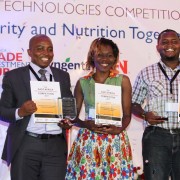Today the U.S. Agency for International Development (USAID) East Africa Trade and Investment Hub (the Hub) signed a grant with Generation Program Kenya Limited, a local subsidiary of the McKinsey Social Initiative, to create 2,000 full-time jobs and provide over 100,000 hours in skills development for young people in the apparel industry.
East Africa is endowed with a wealth of natural resources, including some of the most spectacular wildlife and ecosystems in the world. When managed effectively and equitably, these vast yet fragile land, water and wildlife resources can contribute to the national economy and improve the lives of local communities. However, the pressure of growing human populations coupled with changing weather patterns, rampant wildlife poaching and trafficking, and disjointed management of shared natural resources threatens the conservation of this natural ‘capital.’
East African countries continue to face health challenges including large numbers of maternal and child deaths and the adverse effects of infectious diseases. Each country faces challenges within their health system that hinder governments’ capacity to meet the needs of its most vulnerable people. African leaders and health experts recognize the necessity of regional approaches in controlling communicable diseases, harmonizing policies and standards, and sharing best practices that are proven to address common health risks that transcend borders.
USAID recognizes the critical role of development in addressing social, economic, governance and other factors that can drive violent extremism or radicalize individuals and communities. Countering violent extremism (CVE) is central to achieving USAID’s mission to end extreme poverty and promote resilient, democratic societies while advancing our shared security and prosperity. We coordinate closely with the State Department and other U.S. Government entities on this issue.

Today, panelists for the East Africa Postharvest Technologies Competition 2017 selected three innovators to split $30,000 in seed capital to scale up and disseminate their technologies to reduce postharvest food losses. Poor postharvest practices currently result in the loss of 60 percent of all food that is produced in Africa.







Comment
Make a general inquiry or suggest an improvement.